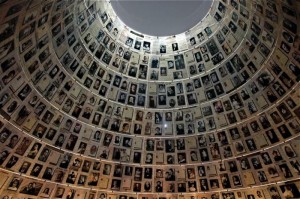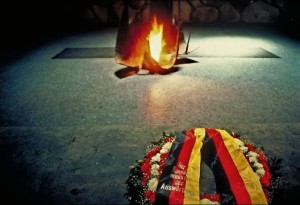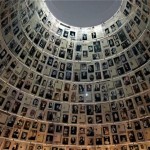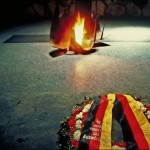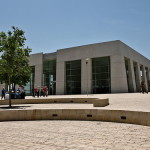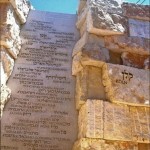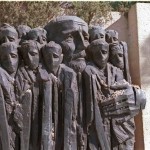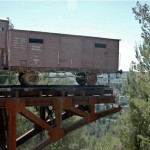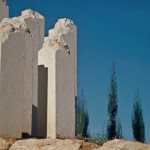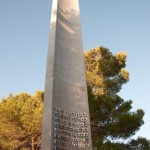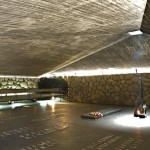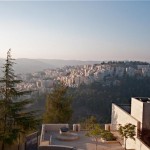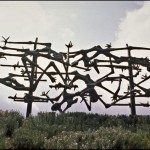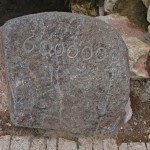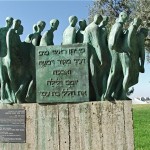Jerusalem
Yad Vashem, Israel’s official memorial to the Jewish victims of the Nazi Holocaust, is dedicated to documenting the story of the six million victims and imparting their legacy for future generations.
Its location is a hillside site on Har Hazikaron, Jerusalem’s Mount of Remembrance. Tree-studded walkways lead visitors through a sprawling complex of museums, outdoor monuments, exhibition halls, an archive, a library and other resource centres extending over 18 hectares.
One avenue is lined with plaques bearing the names of many thousands of non-Jews who risked their own lives to rescue Jews from the Nazis. They are honoured as the “Righteous Among the Nations”.
Yad Vashem’s history museum, a long corridor with stark walls of reinforced concrete, is carved into the mountain. Ten exhibition halls each focus on a different chapter of the Nazi Holocaust that began in 1933.
A visitor to the museum begins underground and walks upwards. The exit involves stepping from a dark corridor into daylight, on a balcony overlooking the Jerusalem valley. The symbolism represents the passage of the Jewish people through the dark days of the Holocaust to the light of Israel.
5000 communities were destroyed
The archive at Yad Vashem contains 68 million pages of documents, nearly 300,000 photographs and thousands of films and videotaped testimonies of survivors.
It houses comprehensive Holocaust-related departments — historical and art museums, schools and research institutions, extensive archives and library facilities. It also contains a memorial to the 5000 Jewish communities destroyed during the Nazi era and a Hall of Names listing millions of survivors.
Among the memorial sites, the hall of remembrance is a solemn, tent-like structure that allows visitors to pay their respect to the memories of those who died. Here ashes of the dead are buried and an eternal flame burns in their memory.
A memorial to the deportees has a railway cattle-car on rails jutting out over the cliff on the road winding down from the mountain. This cattle-car was used to transport Jews who had been banished from their homes to the concentration camps.
Yad Vashem’s name comes from a biblical verse: “I will give, in my house and within my walls, a monument and a name better than sons and daughters; I will give them an everlasting name [Yad Vashem] that shall not be cut off.” (Isaiah 56:5)
Administered by: The Holocaust Martyrs’ and Heroes’ Remembrance Authority
Tel.: 972-2-6443574
Open: Sunday to Thursday, 9am to 5pm (entry till 4pm); Friday and eves of holidays, 9am to 2pm (entry till 1pm). Closed on Saturdays and all Jewish holidays. Entry is free. Children under 10 are not permitted to enter the history museum. Men should cover their heads (kippahs are available). Entrance to the complex is via the Holland Junction, situated on the Herzl Route opposite the entrance to Mount Herzl and the descent to Ein Kerem.
- Hall of Names at Yad Vashem (© Israel Ministry of Tourism)
- Eternal flame at Yad Vashem (© Israel Ministry of Tourism)
- Visitors’ Centre at Yad Vashem (James Emery)
- Valley of the Communities at Yad Vashem (© Israel Ministry of Tourism)
- Janusz Korczak memorial at Yad Vashem (© Israel Ministry of Tourism)
- Box-car memorial at Yad Vashem (© Israel Ministry of Tourism)
- Memorial to children at Yad Vashem (© Israel Ministry of Tourism)
- Tribute to the Righteous at Yad Vashem (Josh Evnin)
- Hall of Remembrance at Yad Vashem (Francesco Gasparetti)
- Jerusalem from Yad Vashem (Josh Evnin)
- Sculpture commemorating those who perished in Nazi camps (© Israel Ministry of Tourism)
- Stone marker at Yad Vashem (James Emery)
- Monument to those who died in death marches from Dachau (Nina Jean)
- Sculpture dedicated to Warsaw Ghetto uprising at Yad Vashem (© Israel Ministry of Tourism)
External links

